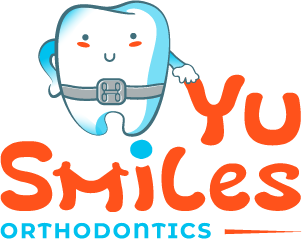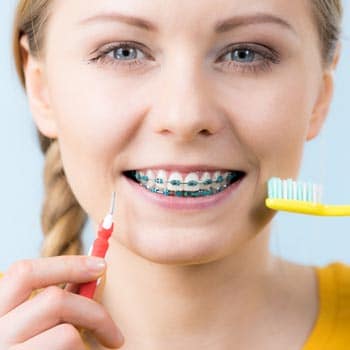Brushing and Flossing
Proper oral hygiene is essential when you have braces. Regular brushing and flossing keep your teeth and gums healthy throughout your orthodontic journey, ensuring the best possible results. Neglecting oral hygiene can lead to more frequent visits to the dentist for professional cleanings.
Key Tips for Oral Care with Braces:
- Brush after every meal: Use a soft-bristle toothbrush to clean around your braces, making sure to remove all food particles.
- Floss daily: Use a floss threader to get between braces and clean the spaces between your teeth.
- Rinse with mouthwash: An antimicrobial mouthwash can help reduce plaque and keep your gums healthy.
If you have a history of gum disease, it’s wise to see a periodontist during your treatment. Watch the video below for a step-by-step guide on caring for your braces.
Eating with Braces
Adjusting your diet is crucial when you first get braces. While it might be tempting to dive back into your regular diet, there are specific foods you should avoid to protect your braces and ensure smooth treatment.
Foods to Avoid:
- Chewy foods: Hard rolls, licorice
- Crunchy foods: Chips, ice cubes
- Sticky foods: Caramels, gummy candies
- Hard foods: Nuts, hard pretzels
- Foods you bite into: Whole apples, corn on the cob
Chewing on hard objects like pens, pencils, or fingernails can also damage your braces, which could extend your treatment time. Protect your orthodontic investment by following these guidelines!
Loosening of Teeth
Feeling like your teeth are loose is a normal part of the braces process. Teeth need to loosen before they can shift into their new positions, and they will firm up in their corrected spots once your treatment is complete. This temporary loosening is a sign that your treatment is working effectively.
Loose Wire or Band
If a wire or band becomes loose, don’t panic—it’s usually not a serious issue but should be addressed promptly. If a wire sticks out and is irritating your mouth, you can use the eraser end of a pencil to gently push it back into place. If the irritation persists, apply wax or a small piece of wet cotton to cover the wire. Be sure to contact our office as soon as possible to schedule an appointment for a repair to ensure your treatment continues smoothly.
General Soreness
It’s normal to experience some discomfort when you first get your braces. Your teeth might be sensitive to pressure for 3 to 5 days, and your lips, cheeks, and tongue may feel irritated as they adjust to the new braces.
Soreness Relief Tips:
- Use pain relief: Take Tylenol or your preferred pain reliever to ease discomfort.
- Apply wax: Use orthodontic wax to cover any brackets or wires that are causing irritation.
- Rinse with warm salt water: A warm saltwater rinse can soothe sore gums and irritated areas.
Rubber Band Wear
Your orthodontic treatment’s success depends on your cooperation. Wearing rubber bands or other appliances as prescribed is crucial for moving your teeth and jaws into the correct positions.
Rubber Band Wear Tips:
- Wear them consistently: Only remove them when eating or brushing.
- Replace as needed: If a band breaks or gets lost, replace it immediately.
- Follow your orthodontist’s instructions: Proper wear shortens treatment time and ensures the best results.
Athletics
If you participate in sports, particularly contact sports, it’s crucial to protect your braces with a custom mouthguard. Inform us about your athletic activities so we can provide you with the right protective gear. Wearing a mouthguard helps prevent injuries to your braces and teeth and ensures that you can continue enjoying your favorite activities safely.


